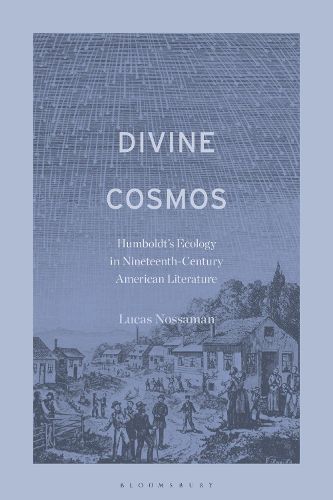Readings Newsletter
Become a Readings Member to make your shopping experience even easier.
Sign in or sign up for free!
You’re not far away from qualifying for FREE standard shipping within Australia
You’ve qualified for FREE standard shipping within Australia
The cart is loading…






Tells the story of how 19th-century American writers re-envisioned science and religion in the age of German naturalist-explorer Alexander von Humboldt's "cosmic" ecology.
When Alexander von Humboldt began to publish the volumes of his Cosmos: A Sketch of a Physical Description of the Earth (1845-1859), Americans suddenly found themselves reimagining the natural world. Humboldt presented nature as a "cosmos," an interconnected web that exceeded the scientific world of static taxonomy and individual species that 18th-century science had produced. As Lucas Nossaman shows, Humboldt's ecology did more than initiate a change in natural science. His writings caused Americans to reconsider how to portray the divine in nature.
Inspired by Humboldt, US scientists, theologians, and literary writers participated in what can be described as a final synthesis of science and religion before the arrival of Darwin's On the Origin of Species (1859). Writers such as Henry David Thoreau, Frederick Douglass, and Herman Melville utilized their particular religious contexts and employed Humboldtian modes of observation to envision nature holistically rather than in terms of singular evidences of "design." They discovered that natural forms connected across regions, and indeed, across the entire divine creation.
Nossaman argues that this "Divine Cosmos" moment provides important background for later conflicts between science and religion - including the debate over evolution - and for the light it sheds on great US writings influenced by Humboldt. With implications for fields across American Studies, Divine Cosmos argues that early ecological thought transformed how Americans perceived the divine in the natural world.
$9.00 standard shipping within Australia
FREE standard shipping within Australia for orders over $100.00
Express & International shipping calculated at checkout
Tells the story of how 19th-century American writers re-envisioned science and religion in the age of German naturalist-explorer Alexander von Humboldt's "cosmic" ecology.
When Alexander von Humboldt began to publish the volumes of his Cosmos: A Sketch of a Physical Description of the Earth (1845-1859), Americans suddenly found themselves reimagining the natural world. Humboldt presented nature as a "cosmos," an interconnected web that exceeded the scientific world of static taxonomy and individual species that 18th-century science had produced. As Lucas Nossaman shows, Humboldt's ecology did more than initiate a change in natural science. His writings caused Americans to reconsider how to portray the divine in nature.
Inspired by Humboldt, US scientists, theologians, and literary writers participated in what can be described as a final synthesis of science and religion before the arrival of Darwin's On the Origin of Species (1859). Writers such as Henry David Thoreau, Frederick Douglass, and Herman Melville utilized their particular religious contexts and employed Humboldtian modes of observation to envision nature holistically rather than in terms of singular evidences of "design." They discovered that natural forms connected across regions, and indeed, across the entire divine creation.
Nossaman argues that this "Divine Cosmos" moment provides important background for later conflicts between science and religion - including the debate over evolution - and for the light it sheds on great US writings influenced by Humboldt. With implications for fields across American Studies, Divine Cosmos argues that early ecological thought transformed how Americans perceived the divine in the natural world.